
First and Only Weekly Online Fanzine Devoted to the Life & Works of Edgar Rice Burroughs
Since 1996 ~ Over 15,000 Web Pages in Archive
presents
Volume 2380a

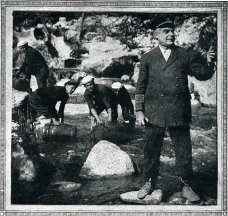
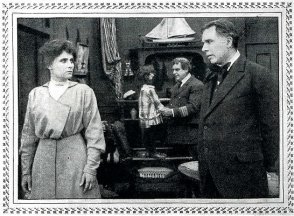
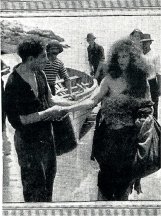





Featured here is the Picture Play Weekly adaptation of The Isle of Content. Why did Captain Spragot, with his five-year-old daughter, go to an uninhabited island in the middle of the Pacific Ocean to spend the rest of his life there out of sight and hearing of the world? Why did a young New Yorker, stranded on that isle, suddenly exert every effort to leave it? And why, when he had done so, did he realize that he had made the mistake of his life? All these questions are answered in this gripping story based on the Selig Diamond-Special of the same title.
The reader may make up his own mind as to
how close this story line follows ERB's novel, The Cave Girl.
In any case we are able to give some exposure to
a rare, long lost film from the early days of movie making.

THE ISLE OF CONTENT
(Selig)
By Kenneth RandThe cast: Mr. Mason, will you please come up?"
Ralph Ashton: Eugene Palette
Jane: Anna Luther
Rosett van Nott: Vivian Reed
Captain Spragot: Al FilsonCaptain Spragot, of the steamer Margaret S., called the request down to his first officer from the head of the companionway, excitement in his tone.
The vessel had just weathered a twenty-four-hour storm, and, the sea subsiding, and the storm clouds lifting, Captain Spragot had found that they had been blown off their course; and he had found something else, as well.
"Look," he directed the mate, as the latter joined him on the deck, pointing to an island that lay on their port bow, "What island is that, Mr. Mason?"
The mate regarded the long strip of land, with its white beach and palm-fringed cliffs beyond, and an expression of bewilderment settled on his face.
"Why," he exclaimed, "It hasn't any name! It's not down on the chart. Off our course, this way, we're probably the first people who have ever seen it! It's a discovery!"
Captain Spragot nodded.
"Yes, that's what it is," he said musingly, "a discovery. Do you notice how peaceful it looks on shore there, Mr. Mason? It would b e a good place to come, wouldn't it, if one were tired of the world? Nobody would ever bother one there. By George, I know what I'll call it -- since it's my right, as its discoverer, to name it -- 'The Isle of Content.' That's how we'll put it down on the chart."
Captain Spragot, with the mate's help, had figured out the island's exact position on the map and hour later. By that time the Isle of Content, as the captain had christened the strip of land, had become no more that a dot on the horizon, in the vessel's wake, as the Margaret S. steamed back onto her course from which the storm had carried her. The steamer was homeward bound, and on its last cruise under her present commander; for Captain Spragot, yielding at last to his wife's frequent entreaties, had promised that he would give up the sea after this trip.
The reason the captain's wife wanted him to resign his position with the steamship company by which he had been employed for more than a score of years, was that she was lonely. Captain Spragot had advanced the argument that their little five-year-old daughter Jane should be company enough for her, with her neighbors, while he was away on his cruises. But Mrs. Spragot had insisted that she wanted her husband with her, too; and in the end there had been nothing for the captain to do but to promise that he would sail the seas no longer.
But a fortnight after he had brought the Margaret S. safely back into port, her owners sent for him again.
They requested that Captain Spragot take the steamer out once more. This would be the last trip they would ask him to make on her. Positively the last. but there was no other captain they could find with his experience, at such short notice, to make a trip to the Philippines with a cargo that had just been offered the steamship company, providing it would agree to deliver it within a month's time. And so, if Captain Spragot could see his way to obliging, the company would not forget it.
Captain Spragot had hesitated, but finally agreed to undertake this one last trip, since the owners had always treated him fairly in his past relations with them.
He might have hesitated longer, if he had known what was going on in his home during his absence. A man named John Western, who had k known the Spragots ever since their marriage, eight years before, had called on Mrs. Spragot an hour after the captain had gone to the office of the steamship company.
Six months before, Western had played the role of a sympathetic listener when Mrs. Spragot had unburdened her heart to him an old friend of the family , of her loneliness because of her husband's periodic long absences in foreign parts.
Western had hardly been able to conceal his joy, over this opening for which he had w waited long and patiently. The opening to declare his love for the captain's wife.
He had poured out the tale of his adoration, then, and begged her to end her loneliness forever in his society -- to run away with him.
She had refused to entertain the suggestion at first. It was then that Western had got in his fine work. He had played upon the sense of loneliness, of neglect, she had confessed to him that she felt. By a dozen -- a score -- of arguments he had tried to show her that her husband cared nothing for her, or he would give up the calling that separated him f rom her. To this she had finally replied:
"I will give him the chance, then, to choose between me and the sea. When he comes back from this trip, I will ask him to keep to the promise he has already given me never to make another. If he does, all well and good. If he fails -- well, then I will send you word to come for me."
That was the way matters had stood between the wife of faithful Captain Spragot and her avowed lover, when the skipper had returned from the cruse during which he had discovered the uncharted island he had named the Isle of Content.
His resignation from the service of the steamship company had made her happy, and driven all thoughts of Western from her mind.
But when, despite her urgings that he ignore the summons from the owners, which she told him she felt sure would mean a request that he take command of another steamer, Captain Spragot had set out for the company's office, his wife's anger had robbed her of all reason, and she had sent her promised summons to the captain's false friend.
"He is going to break his word to me, I know," she informed Western bitterly, when he arrived. "The owners will tempt him by flattering him about his experience an d capability, into taking back his command -- for 'just one more trip.' And that would mean another and another. And that means the same old loneliness for me. I can't stand it."
"You don't need to," the man caught her up, his tone businesslike. "Come away with me now, without another hour's delay. Go upstairs and pack your bag."
The woman left the room to do so. When she came down to Western, fifteen minutes later, she wore a travelling dress and carried a valise which held her personal belongings.
You will never regret this step, my darling!" said the man, who had been impatiently awaiting her return, taking her in his arms.
Neither heard the door open just the, nor saw Captain Spragot watching them from the threshold.
"Now let us go," said she, stepping out of Western's embrace.
She turned -- to meet the captain's accusing gaze. He did not need to ask for any explanation; the scene he had just witnessed told the story plainly enough -- that, and the dress and veiled had his wife wore, with the travelling bag in her hand.
Captain Spragot turned his gaze from her to the man at her side, and his brows went black. In what seemed a single bound, he was upon the cur, with his hands gripping his throat.
The slender, but wiry skipper bent Western back over the table. His hand darted toward his hip pocket and then paused. Glaring down into the other's upturned back, Captain Spragot growled through his set teeth:
"I ought to kill you, but you're not worth rising the electric chair for. I'll have the satisfaction giving you this before I let you go, though you dog!"
The captain smashed him, again and again, with his hard, weather-bronzed fist. Then, pulling him up by the throat, he threw him from him to the floor and turned away without a backward glance. Not once, since the first accusing look he had given her, had Captain Spragot noticed his wife. He walked by her into the next room -- it was a nursery -- and lifted their little girl from her crib. Then, wrapping her in the quilt, he departed from the house. And the next day he sailed on the steamer which had been placed under his command, with his child. Arriving in Manila, he turned over his cargo. And then, heading back for America, he drew out the map on which he and his former mate had charted the position of the Isle of Content.
None but he and that officer knew of the island's existence.
Captain Spragot guided the steamer to a point that was was within a ten or twelve hours' row of the island, though it could not then be sighted from the vessel's deck. Stating that he wished to make some astronomical experiments, he ordered the steamer stopped, and waited until night had fallen.
The, descending with his baby girl to the boat he had stocked with a two days' supply of food and water, and then stealthily lowered from the davits, the captain rowed away toward the island.
He had left a note behind him, turning over the the vessel to the first mate, and explaining that he was tired of the world and meant to leave it -- which was the truth. He asked that no search be made for him. It would be supposed, from this, that he had taken his life and that of his child, and thereby the possibility of the steamer's cruising through the nearby waters to pick up the boat, in the belief that he had accidentally got adrift in it, which might lead to the island's being stumbled upon, would be presented.
For fifteen years, Captain Spragot lived unmolested upon the island with his daughter. Nature had stocked it plentifully with a variety of fruits, nuts, and fresh water. And on that wholesome vegetarian diet Jane, at least thrived. She grew up to be a girl of dazzling beauty.
The world outside her island home she knew nothing of. She had been too young when her father brought her to that strip of sand and jungle in the midst of the unexplored ocean wastes, to remember anything of that other home she had once known in civilization.
The captain never spoke to her of it. Once, playing beside the cliff edge at the rear of the beach, when she had been still a child, she had found some wonderful stones. Half embedded in the blue clay of the cliff, they were of a cloudy, greyish hue; but here and there on their surface a dot or a streak sparkled with all the colours of the rainbow. She had run to show her find to her father. But at the sight of the stones his face had grown stern.
"These are diamonds," he had answered her query. "They are what turn people's heads -- and their hearts, too -- back in the place you know nothing of. Throw them away. Nothing but evil can come from them."
Jane had not thrown the stones away, but hid them, instead, under a big stone she knew of in a cave in the cliff. In the course of time, she had forgotten their existence.
Was Captain Spragot wholly happy on that island to which he had come to spend the remainder of his days? Perhaps. And perhaps not. Cut off from any communication with the world, where his heart had been broken by a woman's betrayal, nevertheless he had his memories of that world to brood over from time to time.
It was to be left to another to prove that the Isle of Content was what its name implied -- another who could remember no other home.
Back in civilization, Ralph Ashton rose from his chair in his lawyer's private office.
"You're sure there's nothing left?" he inquired. "Well, there's no use crying over spilled milk, then. I've had a bully time for twenty-six years of my life, thanks to the money my father left me, and now that my inheritance is gone, I'd be ungrateful to complain."
"What are you going to do now?" his legal adviser asked.
I'm sure I don't know," answered Ralph lightly, and passed out of the office.
The young man had spoken the truth. He had no idea just then of how he was going to shape his future. He felt that the problem needed thinking out, and he wanted time wherein to do so. If there was only somewhere that he could go, to think quietly and without distractions for a while --
And then, looking over that morning's newspaper, his eye fell on the advertisement of a steamship company. It offered the position of steward on a cruise to the southern Pacific Ocean, to a young man of just his age and physical and mental abilities.
That same day, Ralph applied for the berth. He was engaged; and, a week later, he was steaming away from New York City, to be gone, as he supposed, for two months. During that time, he would be fed and housed and given ample opportunity to think of what he was going to do to weather the blow of finding the fortune he had inherited from his father swept from him overnight.
It was midnight, three weeks later, when Ralph was thrown from his bunk by an explosion which shook the steamer from stem to stern.
Scrambling into his clothes, he ran toward the deck. There and excited deck hand informed him that one of the boilers in the engine room had exploded; the vessel was doomed. Even as the man spoke, the deck slanted under their feet, and they were swept toward the rail, over which Ralph tumbled, to find himself in the water.
He swam away from the vessel, putting all the strength he possessed into this strokes, remembering what he had read of the suction that accompanies a ship's sinking.
When he ceased swimming, and looked back in the direction from which he had come, only the pitch-black night, unrelieved by the steamer's lights, met his eyes. The vessel had gone down, and, it seemed, he was its sole survivor.
Ralph swam on -- whether toward land and safety, or the open sea and his doom, he knew not.
When dawn broke, three hours later, he swept the horizon with bloodshot eyes. He was near the end o his strength, but the sight of a palm-crested island that met his gaze dead ahead of him, though still the best part of a mile away, spurred him to redoubled efforts.
When he reached the shelving white beach at last, he fell exhausted upon it, and lost consciousness. The tide was turning, and he might have been washed out to sea again by the surf that broke over him.
But a girl, with her hair streaming wild and in a dress made of plaited leaves, ran down from the cliff, where she had spied him, and dragged him by main strength out of the water and up on the beach, to safety.
The girl was Jane, who was then eighteen.
Her father had died six months before, leaving her all alone on the island.
She sat down to wait for this companion of her solitude which the sea had brought her, to regain his senses. Long before he had opened his eyes, Jane, who could not remember ever having seen another man but her father, whose appearance suffered by comparison with this handsome young stranger, had fallen in love with him.
When Ralph at last sat up, brushing the back of his hand across his forehead dazedly, he stared at the girl before him as though she had been a figure in a dream.
She was a dream of loneliness. with her heavy, spun-gold hair, and her apple-blossom complexion, which her long life in the open had given her. Ralph Ashton, accustomed as he was to the fair women of fashionable society, told himself that she was the most beautiful creature he had ever seen.
"Who are you?" he asked. "And where did you come from?"
Jane told him her story -- all she knew of it. That her father had brought her to that island, when she was a little child, and that she had lived there ever since. Her father was now dead, she explained. And for half a year she had been dwelling upon the island all alone.
"I'm so glad you've come!" she told him, with innocent candor. "It'll be lots jollier, living here together, than it was before."
Ralph Ashton himself was rather glad that fate had seen fit to cast him upon that island, and he said so. Jane, springing to her feet as gracefully as a young fawn, took his hand in hers and led him on a tour of inspection over her island home.
She showed him the hut which her father had constructed of leaves and branches, when they first came there, for them to live in. Next the store of fruits, nuts, and dried fish that he had laid away in a smaller but near by, when he had felt the hand of Death upon him, and so that she would want for noting when she was alone.
Ralph saw that the entire population of a small American town might live on that island for years, and be amply provided by nature with all the food they needed.
At the end of a fortnight, he had though out his future. Why should he ever leave this Eden spot, far from the world an d its petty cares? He had long since fallen in love with the wonder girl he had found upon the island.
And that she loved him, too, he had soon found out. His mind made up, when two weeks had passed he took her hand as they sat side by side upon the beach in the moonlight and avowed his love for her.
When she lifted her lips to his, in silent token that her heart belonged to him, Ralph checked her. He ordered her to kneel beside him on the sand.
And there, unseen except by the eyes of God, he vowed to take and cherish her always as his wife. And she, repeating after him the words he told her to, claimed him as her husband for all time.
As the weeks passed, and lengthened into months. Ralph was happy. He had found that island, whose name Jane had told him, as her father had told it to her on their arrive al there years be before, to be a real Isle of Content. If he had not forgotten the world, he thought of it without regret.
Until one day, exploring the cave in the cliff, his foot turned over by accident the small rock under which Jane had buried those greyish stones, with their pretty sparkle here and there on their surface, so long before.
At once he recognized them for what they were -- uncut diamonds.
And he saw that, from their size, they would be worth a fortune back in civilization. A fortune which he had only to return to the world with them in his possession, to attain.
From the hour of his discovery of the rough gems, Ralph's attitude toward the island changed. He began to hate it as a prison, wherein he was kept from enjoying the luxuries of life from which he had so long been separated. If he had been contented to spend the rest of his days alone there with Jane before, he was so no longer.
He built a signal fire on the highest point of the cliff, and tended it each day, in the hopes that some passing ship might sight the smoke and take them back to civilization.
And when he was not nursing the fire, he sat for hours rubbing at the stones. Jane found herself neglected. When she remonstrated, Ralph answered her rudely. His attitude toward her, as well as toward the island, had changed. If he still loved her as much as ever, he was too preoccupied to show it. The diamonds that meant wealth, and the coming of a ship that would mean his chance to spend it, were all he thought of.
And then, one day, the signal fire was seen. A vessel grew from a speck on the horizon ot the distinguishable shape of a large steamer -- a steamer that was coming head-on toward the island. Ralph went all but mad with joy. With Jane at his side, and his precious diamonds hugged out of sight under his tattered shirt -- lest somebody on the rescuing steamer might attempt to steal the stones from him -- he waited on the beach in feverish impatience for the arrival of the launch that was sent off from the ship to them.
Jane, as she stood at the steamer's rail two hours later, watching her beloved island disappear in the vessel's wake as it resumed its voyage to America, was sad. She had a premonition that nothing but unhappiness could come out of their departure from that peaceful spot.
And her presentiment was soon to be realized.
In New York, Ralph sold the diamonds for a sum in excess of his expectations. And with the considerable fortune which he thus had in his possession, he rented a magnificent home for Jane and himself, and then flung himself, with fresh zest, into the whirl of social gayety, where he had previously squandered his father's inheritance.
Upon his return to civilization, he had made his marriage with Jane legal, by a quiet church wedding.
But Jane, despite all Ralph's urgings, could not enter with him into their new life. All her tastes were quiet, and she found no enjoyment in the dances, dinners, an d gay theatre parties wherein he took so much pleasure. Early finding this out, Ralph soon looked elsewhere for a more congenial companion. And he found her in Rosett van Nott, a young woman of the fashionable world.
Jane found herself neglected by the man she loved, as she had been on the island after his discovery of the diamonds; only now the pangs of jealousy were added to make her unhappiness more poignant.
She rebuked Ralph for being seen so much in the society of Rosett. This led to an open quarrel between them. He declared his intention of going about with her as much as he liked -- in view of the fact that his wife would not accompany him to the places he wished to go, he announced that he had a perfect right to.
One day, three months later, Jane received a call from Rosett herself."You and Ralph are utterly uncongenial," the woman told her. "Why don't you give him back his freedom? I believe he loves me, though he has not yet declared himself. The reason, of course, is that he is still tied to you. In fairness to both and and me, why don't you get a divorce?"
Jane rose, with clenched hands and flashing eyes.
"I won't give him up!" she answered. "He belongs to me -- I dragged him from the sea, and he owes his life ot me. He is mine, I tell you, and I mean to keep him!"
Jane pent the next two day following Rosett's call in deep thought. The time, it seemed, had come for her to act. If the situation was to be saved at all, now was the time to try to do it, before it was too late.
A plan -- a daring one -- had come to her. She determined to carry it out, and stake everything on its success or failure. The next morning, she left the house and went to the water front of the city.
Two hours later, she took her departure from a sea captain with whom she had held a secret conference.
Ralph was returning from Rosett van Nott's home, to which he had escorted her after a dance, on the night following, when out of the doorway he was passing three powerfully built men sprang upon him, overpowering him.
One held a sponge saturated with a pungent liquid to his nostrils, and Ralph lost consciousness.
When he came to -- how many hours afterward he had no means of knowing -- he found himself in a bunk on board a steamer which, he could tell from the motion under him, was well out to see. At regular hours thereafter, twice a day food and drink were put in at the door of the cabin where he was kept a prisoner. A fortnight went by, and then, one night, Ralph heard the vessel come to anchor.
The next morning he was brought up on deck and lowered over the side into a launch. It shot him across the water toward an island -- an island he recognized.
And there, waiting for him on the beach, was Jane. Jane clad again in the dress of leaves in which he had first seen her, and with her hair streaming free. As Ralph stepped out of the launch and went to her, a new light had come into his eyes.
"I understand, dear," he said, taking his wife into his arms. "I was happier here with you than anywhere else on earth. The world has nothing to offer that compares with this. And here we will stay together till the end of our lives -- on our Isle of Content."
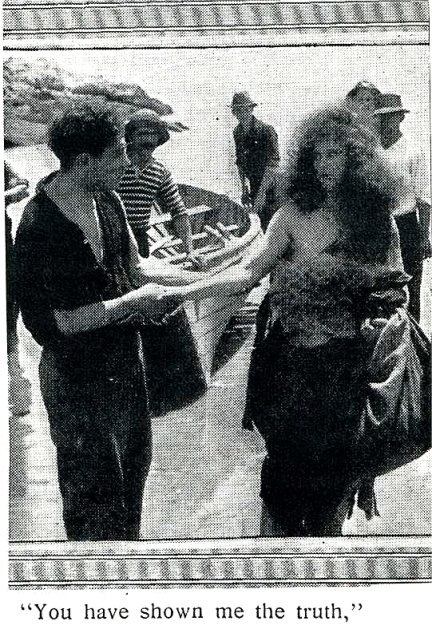

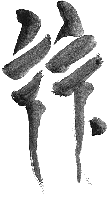
BILL HILLMAN
Visit our thousands of other sites at:
BILL and SUE-ON HILLMAN ECLECTIC STUDIO
ERB Text, ERB Images and Tarzan® are ©Edgar Rice Burroughs, Inc.- All Rights Reserved.
All Original Work ©1996-2009/2019 by Bill Hillman and/or Contributing Authors/Owners
No part of this web site may be reproduced without permission from the respective owners.